#katara analysis
Text
Katara's Legacy in LOK: "Healer Wife of the Avatar" (part I)
I only recently finished watching all of The Legend of Korra from start to finish. Based on the analyses I’ve read from the time the show was airing, there seemed to be a decent amount of backlash against how the adult gaang was portrayed - particularly Katara. LOK’s fanbase has grown since then, though, especially during the 2020 renaissance, and I was surprised by how many recent positive comments I’ve seen from fans on Katara’s role.
Because if you paid attention at all to Katara’s characterization compared to Aang, Sokka, Toph, and Zuko, it’s clear just how much Legend of Korra has tarnished her “legacy” or lack thereof.
I will be splitting this analysis of lok!Katara into two parts:
First, I will break down her portrayal in the show compared to the other members of the gaang to demonstrate how Katara received the worst treatment from the writers. Though I did have problems with the other characters’ portrayals as well, I don't have time to discuss them in-depth in this post. Then, I will counter common arguments used in defense of lok!Katara’s portrayal on the grounds that they do not provide an adequate in-universe explanation for her character’s drastic change from ATLA.
For part 1, I decided to examine everything we know about the gaang after the original series only based on the information provided via Legend of Korra (excluding poor Suki, who is never mentioned at all). For each character, I will answer the question “What do we know about [character] based solely on their role in Legend of Korra?”
Sokka

Assuming we have never watched ATLA before, what do we know about Sokka based on LOK?
Well-respected for his wisdom and leadership, as he was Chief of the Southern Water Tribe, a councilman in Republic City (Representative of the Southern Water Tribe), and the chairman of the United Republic Council
Played a significant role in Yakone’s bloodbending trial - moderated the Council’s deliberations and announced their decision to find Yakone guilty
Worked together with other political/military leaders - Zuko, Tenzin, and Tonraq - to protect Avatar Korra by designing prisons for Red Lotus members that would be impervious to their bending
Toph mentioned they were friends in their youth, describing a time he was stuck in a hole when she was trying to teach Aang earthbending
Sokka, Toph, and Aang seemed to have remained friends into adulthood as they all worked together to defeat Yakone
Fond of his trusty boomerang, which he claimed to have used to win a fight against a man with combustion abilities
Due to his achievements, has a statue built in his honor in front of the Southern Water Tribe Cultural Center in Republic City
Zuko
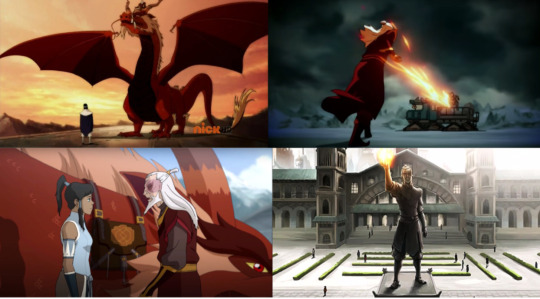
Assuming we have never watched ATLA before, what do we know about Zuko based on LOK?
Former Fire Lord and co-founder of the United Republic, who worked with Avatar Aang after the 100 years war to transform the Fire Nation colonies into the United Republic of Nations
Zuko and Avatar Aang had a rocky start, as Zuko described a time when he once hired a man with combustion abilities to kill Aang in his youth, but they eventually became close friends
Acted as Aang’s counsel and was described as being the person who knew Aang better than everyone else, leading Korra to turn to him for advice
Good friends with the Southern Water Tribe - worked with Sokka, Tonraq, and Tenzin to imprison Red Lotus members that wanted to kidnap Korra, specifically working with Unalaq and Tonraq to build a prison to hold P’Li
Years later, continued to work against the Red Lotus when they broke out of prison
Investigated the prison break of Ming-Hua, sent word to Lin Beifong to protect Korra, then flew off on his dragon to stop the Red Lotus from breaking P’Li out of prison
Fought Ghazan using his firebending during the Red Lotus break-in
Discussed the Red Lotus situation with Lin, Korra, and the others, before leaving early on Druk (his dragon) to return to the Fire Nation and protect his family
Despite being in “retirement,” remains an active participant in international relations - makes appearances as Prince Wu’s coronation and Jinora’s airbending master ceremony, along with engaging in discussions with President Raiko, Tenzin, and Tonraq about the future of the Red Lotus after Zaheer was imprisoned again
Highly respected and honored for his achievements - Bolin and Mako were impressed to meet him, statue was built in his honor in Republic City
Had a close relationship with his Uncle and his surviving family include his daughter, Fire Lord Izumi, and his grandson, General Iroh II
Toph
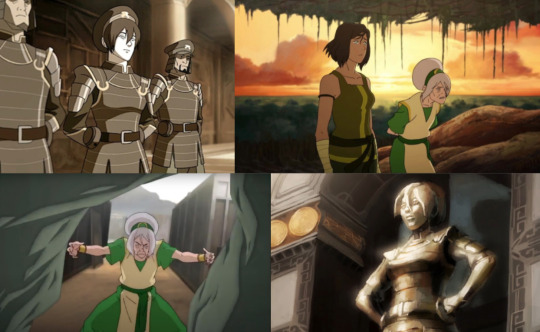
Assuming we have never watched ATLA before, what do we know about Toph based on LOK?
Previous Chief of Police in Republic City, founder of the first metalbending police force, founder of the first metalbending academy
Renowned for inventing metalbending, which is utilized for the development of modern technology and innovation in Republic City and the Earth Kingdom (particularly, Zaofu, is regarded as the safest city in the world due to it being made entirely out of metal)
To honor her metalbending achievements, there are several statues of her in Zaofu
Good friends with Avatar Aang, whom she affectionately named Twinkletoes, and was his earthbending teacher
Worked with Aang to arrest Yakone and was present at Yakone’s trial
Acted as a mentor to Korra, helping Korra face her fears and trained with her
Despite her old age and grumpy personality, Toph remained a strong fighter - easily able to beat Korra during training sessions, take down Kuvira’s sentries, and successfully break into Kuvira’s prison using her earthbending and metalbending abilities
States that her fighting days are over due to her old age, but has no problem fighting to save her family when they are captured by Kuvira (twice)
No interest in involving herself in current political problems in the Earth Kingdom, but will defend her family from political forces that threaten them
Strained relationship with her daughters (Suyin and Lin) because of how busy she was with her job, giving them too much freedom as she didn’t want to be as strict as her own parents
Covered up for Suyin’s crimes to save her reputation, leading her to retire early from guilt
Eventually repairs her relationship with her daughters - admitting she wasn’t a great mother but had great kids
Spent rest of her life living alone in a swamp, mentioning she has previous experiences with the visions it produces
High reputation in Republic City - has a statue of her built in front of police headquarters, Asami is impressed by her, Bolin calls her his hero
Aang
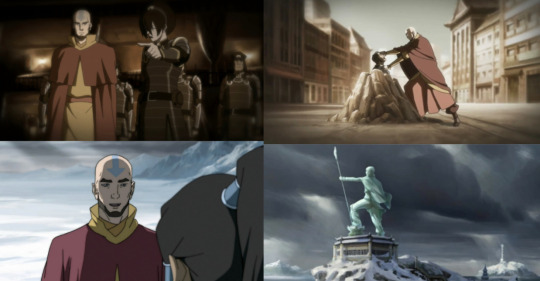
Assuming we have never watched ATLA before, what do we know about Aang based on LOK?
Previous Avatar before Korra, negotiated relations between people of all nations to keep peace and balance and served as the bridge between the Spirit World and natural world
Worked with his closest friend Zuko to transform the Fire Nation Colonies into the United Republic of Nations after the war
Lost his entire culture of Air Nomads to genocide during the hundred year war and was devastated - his greatest dream was frequently described as rebuilding the Air Nation and reviving Air Nomad culture
He began to do this by founding the Air Acolytes, who preserved the culture, practices, and teachings of the Air Nomads passed on from Aang
Placed all of his hopes and dreams for the future on Tenzin's shoulders, his only airbender son
Deeply connected to the Spirit World and was an esteemed spiritual leader, hoping his son would one day experience the same
Traveled the world with Tenzin so he could learn as much as possible, but was so focused on doing his duty to the world that he never had time for his other kids, Kya and Bumi, whom he had with his wife, Katara
Kya and Bumi felt like a disappointment to their father for not being airbenders and Bumi never felt connected to his father’s culture until he became an airbender later in life
Aang’s acolytes did not even know Aang had other children besides Tenzin
All of this seems to indicate Aang valued the ability to airbend the most in his children, leading to his waterbending/nonbending kids being neglected
Greatest flaw mentioned as his tendency to cut and run when things get tough
Despite all this, he was highly respected and admired by most characters in the show for all his achievements as Avatar and his wisdom
Assisted in the arrest of Yakone with Toph, a friend of his, and used energybending to remove Yakone’s bending
Gave Korra advice along with restoring her bending and bestowed upon her the ability to energybend
His grandkids (Meelo, Jinora, and Ikki) enjoyed hearing stories about his youth, such as his visit to Wan Shi Tong’s spirit library and his time with Guru Pathik at the Eastern Air Temple
Described as natural leader by Tenzin, sweet-tempered by Lin, and was good friends with Iroh
He built the air temple on Air Temple Island and in his honor, Aang Memorial Island was named after him and a statue of him was built
He’s so well-known and respected that there are even Aang-themed carnival games at the South Pole
Katara
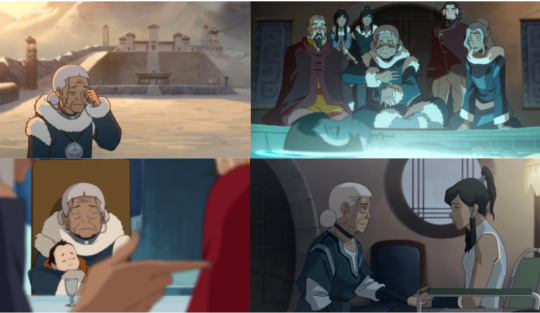
Assuming we have never watched ATLA before, what do we know about Katara based on LOK?
Described as the best healer in the world, responsible for teaching Korra how to heal, and mentioned to be a waterbending master
Monitored Korra’s avatar training and spoke to the Order of the White Lotus when Korra was ready to begin airbending training
Declared bloodbending illegal, but was not present for Yakone’s capture or trial
Attempted to restore Korra’s bending after Amon took it, but failed
Failed to heal Jinora when she was trapped in the Spirit World
Tries to guide Korra’s healing process after she is poisoned, but is unable to heal her on her own
Worked to heal the injured after Unalaq’s attack
According to Toph, Katara didn’t get involved in the civil war taking place in her homeland because of her old age
Mentions to Korra she knows what it’s like to go through a traumatic experience but doesn’t elaborate, instead describing Aang’s trauma
Married to Avatar Aang and had three kids - Tenzin, Kya, and Bumi - and three grandchildren - Ikki, Jinora, and Meelo
After Aang and her brother died, she was incredibly lonely, prompting Kya to move to the south pole to be with her. Misses her family that has passed away.
Her kids don’t visit her much, Meelo doesn’t even recognize his grandmother. She cries when Tenzin and his family leave.
Never speaks about her own life, but Jinora asks her once about what happened to Zuko’s mom, indicating they may have known each other.
By reading those summaries, it should be obvious just how differently Katara’s character was treated by the writers compared to the others. Katara’s legacy is reduced to simply being the “healer wife of the Avatar.”
And before anyone tries to twist my words: The problem is not that she is a mother, a wife, and a healer. The problem that is all she is ever allowed to be. Her entire identity revolves around:
Trying to heal people
Being the Avatar’s wife and occasionally offering random pieces of advice about what Aang would do (instead of, you know, giving advice based on her own experiences)
Missing her family
Again, none of these characteristics are inherently negative - the problem is how poorly they are written for Katara’s character. We are told things about her that just don't match up with what is shown in LOK canon. We're told that she’s a world renowned healer, but every time we see her use these abilities, she fails. We’re told that she’s the Avatar’s wife, but he was closest to his friend, Zuko. We’re told that she’s a mother who cares about her family, but we don’t know anything about her relationship with her children (and in fact, we know far more about her children's relationship with Aang).
Katara has no characteristics, no personality outside of her relationship to others - whether she’s acting as a healer, a mother, or a wife (this is some textbook misogynistic writing). She never speaks about herself, never mentions having any friends - only ever speaking about her husband, never describes her life before being a mother or a wife, is never shown to be honored or respected in the way the rest of the gaang is, has no political titles, and has only one post-atla accomplishment to her name. This is in contrast to Aang, Zuko, and Toph - all of whom have children but are never reduced solely to being a parent, all of whom are implied to be close friends, and all of whom have made multiple important contributions to the world of LOK. Even Sokka - who is barely in the show - is shown as having more achievements than Katara. I’m not sure how anyone could see this as doing Katara’s character justice.
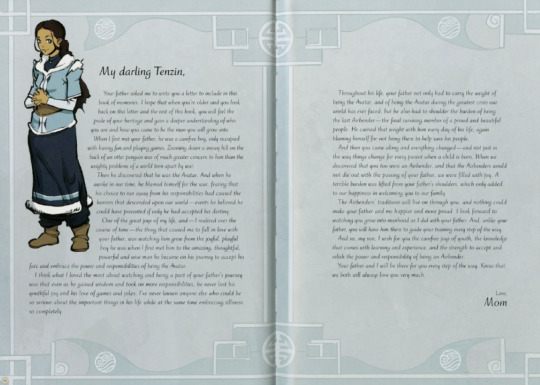
I want to end with this excerpt from the book Avatar: The Last Airbender: Legacy - while not from Legend of Korra, this letter written by Katara to her and Aang's son, Tenzin, is a perfect demonstration of Katara's poor characterization post-ATLA. Despite being written by Katara, this entire letter is about Aang. I'm honestly not sure why the writers didn't just have this letter written by Aang himself because there are no insights that Katara adds to it.
The letter starts with Katara saying that she hopes this letter will help Tenzin "feel the pride of [his] heritage and gain a deeper understanding of who [he is]." And yet this letter never discusses the fact that Tenzin is the son of a waterbender and an airbender, never discusses any of the lessons Katara has learned in her life or the hardships she's overcome, never mentions any part of water tribe culture, never even mentions her own brother or father or mother (family is important to Katara, but apparently the writers only think that her family with Aang matters). The letter is entirely about Aang's struggles and triumphs because post-ATLA Katara doesn't matter outside of her relationship to her husband and kids.
Part 2
#katara#katara analysis#atla#zutara#anti lok#lok critical#this is not shipping related at all but tagging zutara for visibility#pls show up in the tags tumblr i don't want to repost this a third time#my post#my meta
218 notes
·
View notes
Text
Why & How Katara is the Strongest Waterbender
The ATLA fandom is funny. Because if there's one member of the Gaang whose skills are continuously doubted, it's Katara's.
No one hesitates in saying that Toph is the strongest Earthbender in the world. Aang has always been maintained as a natural prodigy. Sokka's strategic intelligence and cleverness are never in question. Most people are positive that Zuko would have beaten Azula if she hadn't targeted Katara and hail him as a swords master.
But for some reason, it's always Katara whose proficiency is either called into question or severely downplayed.
Some are skeptical about the legitimacy of her becoming a master in a short time. Others are certain that her victories are due to plot manipulation. Both of these arguments that ATLA is a kids' show which pushed it into giving her the win.
(Funny how ATLA is the greatest piece of media ever read until it comes to anything pertaining Katara's character lmao)
So I wanted to take a minute to talk about the progression of her waterbending skills and how she became Master Katara.
Pre North Pole
The first time we really see Katara practice waterbending is in The Waterbending Scroll when she decides to show Aang her limited very skill set. She noticeably has a difficult time with her bending, whereas he seems to pick it up rather quickly.
As we know, Katara has never met another waterbender before. She has no idea what their bending is supposed to look or feel like. And that's reflected in the moves she shows Aang.
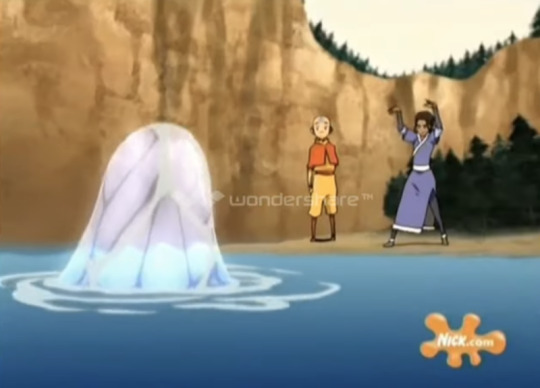
I want to draw attention to Katara's stance here. She's stiff, even a little awkward. She's standing where more like an Earthbender. We see this repeated when she's practicing the Water Whip.

Even later when she does perform the Water Whip correctly, there are still traces of this.

You know how Iroh learned to redirect lightning watching Waterbenders? Well, my assumption (at this point I'm 80% sure it's meant to canon) is that Katara learned most of her bending by watching Aang and the Earthbenders they met around the world.
It makes sense, right? They would have been the closest thing to Waterbenders she could have learned from. She even asked Aang to teach her in the first episode. So the start of her bending began with incorporating the forms of Air and Earth.
And we see the results of that in her fight with Pakku.
Fighting Pakku
Katara's fight with Pakku is a great demonstration of his visually. He's a master, so he's already proficient at "push and pull." Katara is not. She's done it before, but it's not her go-to style when she's fighting. And we can see it in this fight.
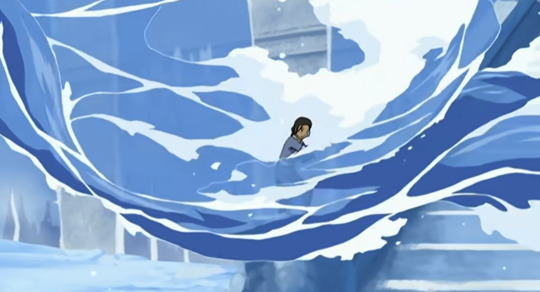

Again, her stance is firm. She either blocks his attacks or bats them away. She doesn't reinforce and redirect them like he does hers. She isn't fighting like a Waterbender, she's fighting like an Earthbender.
Not to say this is a bad thing. Pakku himself even admits that she's good even though they both know she can't beat him.
Why am I bringing this up? Because one thing about Katara that's overlooked is her adaptability. When she didn't have a waterbending teacher, she made do with observing Earthbenders. She picked up Pakku's teachings even better than Aang had. And going forward from here it really begins to shine in her bending.
She completely dominates Pakku's other students and Zuko (twice). Why? What makes her so special compared to men who have been training their whole lives?
Because water is the element of change. By being so proficient in adapting (not just in her bending, but openly embracing different things and experiences and people), Katara unknowingly embraced the mentality of her element.
(It's actually a funny twist of fate because you could make the point that the North held its other Waterbenders back by being so bound to and unflinching in their traditions. It would explain why none of Pakku's students even stood a chance against her)
If you think about it, you could draw parallel to Yue explaining the history of Waterbending to Katara to the Sun Warriors explaining fire as an element to Zuko. In both cases, you can see that they're able to see and understand their element in a new light. Although it's more of a realization moment for Katara as she already knew about pushing and pulling and it's more of a lesson for Zuko who was taught something completely different.
Katara vs Azula (Round 1)
You know how I said people attribute her wins due to plot manipulation because ATLA is a kids' show? Well it seems like Katara vs Azula is the scene they focus on the most for that.
But let's be real, this isn't a fluke. The show purposely draws attention to Katara prowess and skills during this fight.
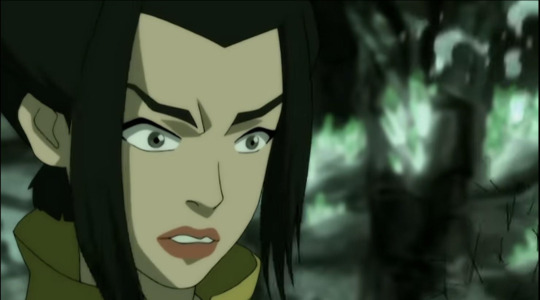
Azula is someone who's always in control. She's someone who goes into fights with full confidence. But she is completely thrown off by Katara's abilities here.
And this is something that persists throughout the entire fight. Katara completely overpowers her. At no point during the fight did Azula have the upper hand against her.
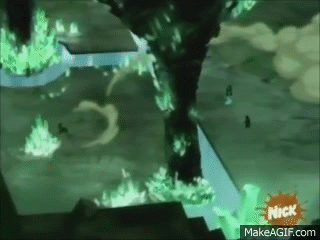

And remember, this is Azula's fight. She's the one who imprisoned Katara and Zuko. She's the one who attacked Katara and Aang to begin with. Sure, she was probably counting on her manipulation of Zuko working and him backing her, but there was no guarantee that he would be able to get away from Aang long enough to help her.
And right after this, Aang really struggles against Azula. He doesn't own the fight nearly as well as Katara does.
So, we know it isn't a fluke. The creators intentionally made Katara outclass Azula here. She's canonically the superior bender between the two of them. And that's not a small feat by any means. Azula at this time is one of the best Firebenders alive, probably fourth (after Ozai, Iroh, and Jeong Jeong (she could possibly be above Jeong Jeong)).
So what was the reason for this? Why was Katara able to outclass Azula so effortlessly?
Well here's where Katara's mastery of the meaning of her element comes into play again. She understands and excels in the concept behind water. Always changing, always adapting. She embraces water to its fullest capabilities (which also includes incorporating other elements into it; water would actually be the best element to do this with). The entire fight, she's switching stances and forms and keeping Azula on the evade. Whatever Azula throws back is dealt with without an issue.
And as we know, Azula (and most Firebenders) misunderstand fire as an element. She uses it solely as a destructive force, but it's also energy, life, and passion. This is also part of the reason Zuko lost so easily in the Northern Water Tribe; he also had the same issue. Katara's proficiency in water as not just a weapon, but an element, gave her the advantage over Azula she needed.
Katara vs Hama
A debate that comes up a lot is who's the better bender between Katara and Amon. To that I have always said Amon was taught Bloodbending, Katara just did it.
Let me reiterate: NO ONE TAUGHT KATARA BLOODBENDING. Hama explained the concept to her, yes, but never actually taught her. In fact, she did not expect her to pick it up without guidance. In her own words, "You should've learned the technique before you turned against me."
This was a technique that took Hama decades to learn. Tarrlok and Noatak were trained relentlessly. And Katara just... Did it. No guidance and no build up. This supports that Katara's adaptability and versatility in her bending is unmatched. She's able to comprehend and perform advance concepts with no training or teaching.
Now that we got that out of the way, this fight is so comprable to Katara vs Pakku. This is the second time she's fought a master and we can see how much she's improved. So much so that she doesn't even struggle against Hama.

At this point, she's mastered "push and pull." She's able to take everything Hama throws at her and send it right back with little to no effort.
But she takes it a step further.
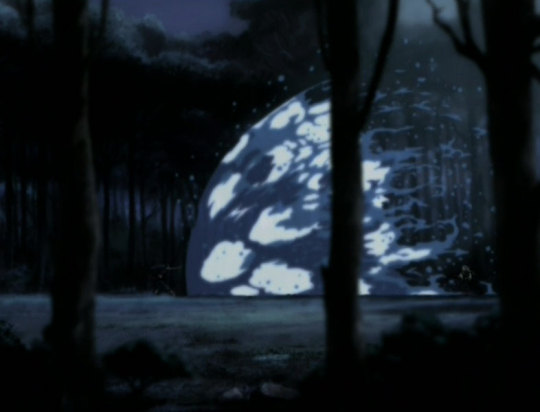
Instead of redirecting, Katara completely stops Hama's onslaught. This undoubtedly is something she picked up from Earthbenders. It certainly isn't a Waterbending technique, yet somehow she made it into an effective move.
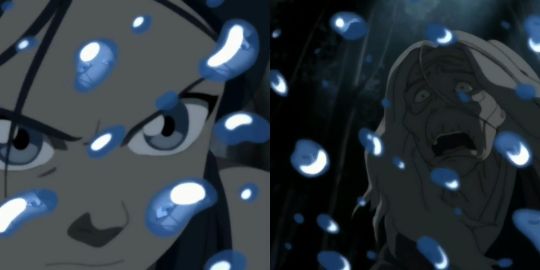
Look at Hama's face. She's completely thrown off by this. This was not something she ever expected out of any Waterbender. She was completely unprepared for Katara to be able to outmatch and overpower her.
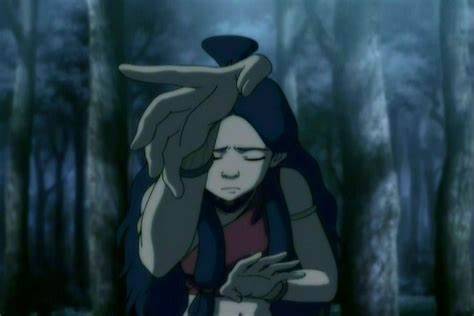
Katara completely surpassed her, solidified by using the technique she invented against her.
I was going to talk about Katara and Azula's second fight, but there isn't much to add there. I already compared the difference in their skills talking about the first fight, and the Agni Kai is an escalation of that. The outcome of the Agni Kai was already decided and confirmed in the catacombs.
And that my friends is how and why Katara is the best Waterbender in the world
#master katara#katara of the southern watertribe#katara analysis#give my girl her due respect#katara is the greatest waterbender in the world#no i won't be taking criticism#argue with the wall#katara deserved better
124 notes
·
View notes
Text
I've been thinking a lot about Katara and her feminism vs. her desire to preserve her dying culture. Like I know that the SWT probably isn't as sexist as the NWT, but there are still a lot of enduring practices that have roots in patriarchy, as demonstrated by Sokka's earlier sexism.
So I think Katara would end up with an odd mix. She's obviously a staunch feminist who thinks girls and women should follow their own paths, regardless of what society in general thinks their roles should be. But at the same time, she can't escape from some of the subtler (and possibly more insidious) traditions of 'propriety' and the role of women as the homemakers.
[Obligatory disclaimer that I don't know that much about Inuit culture when it comes to these things. I'm purely basing this off of what is shown in the cartoon itself.]
Something that kinda goes along with this is Katara's necklace. To her, it's a symbol of her grandmother's struggle for independence, as well as a memento of her mother and the sacrificial love she displayed. In the NWT, it represented (at best) a romantic commitment and (at worst) a transfer of property. I don't think she'd associate hers with either, and she'd probably be insulted if Aang tried to give her a new one when proposing.
(I maintain that the necklace she wears as an old lady is the same one she had in childhood. The fact that it looks wonky in that one screenshot is nothing more than lackluster rendering.)
Anyway, I've gone a little off topic. I just think she's a really interesting study in how someone can rail against the negative parts of their culture that don't appeal to them, while also having an internalized fondness for some of those same traditions, simply because they are familiar and nostalgic.
Take Toph for contrast. I don't think she's the butch anti-feminine person a lot of people make her out to be. She just does what she wants. She's perfectly happy to go to the spa or wear dresses and makeup, but only if it's her choice to do so. She's railing against the repressive and oppressive culture of elite EK society simply because she previously had no agency over her life.
Meanwhile, Katara takes an active role in seeing to the physical and emotional needs of her brother/friends. And even though that 'motherly' role is largely a trauma response and something she deeply resents at times, I think it's also a source of comfort to her. Something about her culture that she desperately clings to.
I think a lot about her and Aang's life post-war. They would be very focused on reconstruction for years, most likely. Katara would have her own projects with the Water Tribes, but also spend a lot of time helping Aang. Some part of her craves the validation of appearing to be 'proper' concerning her relationship with him. Maybe she's a bit hypocritical about it: unwilling to wait until they've settled down to be intimate, but also reluctant to publicly break certain social 'rules'.
She keeps telling herself there's so much to do in the world, and maybe she feels this heavy burden to do as much good as she can before allowing herself to rest and slow down and create the family she's always wanted.
But then ten(ish) years have passed and suddenly! Baby on the way! Oops! Katara knows she's a public figure and cares a lot about how she's seen. She wants the respect of the people from her own culture. And so they stop. They get married. They settle down.
Katara becomes the wife and mother, which she definitely wants while also having some lingering regrets and conflicting feelings. She still wants to be a role model for other girls and women, but she likes not being constantly on the move and fighting people and playing politics. She likes getting up in the middle of the night to sing an old Water Tribe lullaby to her baby. She likes it the most when Aang is there because he's always seen her as an equal partner, not a piece of property.
Anyway, I didn't really have a point. Just rambling about my own headcanons. I've always put a lot more thought into Toph and Sokka's characters, but I guess Kataang has been on my mind lately. And tbh I never gave Katara the attention she deserved when writing fics, which is a travesty.
62 notes
·
View notes
Text
In Defense of Katara
Update: The views expressed on Aang in this post are majorly dated.
Katara has been..

a controversial character. Particularly for the following reasons.
Supposedly talking about her mother "all the time", bringing it up out of context, making it all about herself and lashing out about it.
But before properly analyzing her character, let's first actually list off all the episodes where Katara has mentioned her mother (also in video form):
The Boy in the Iceberg:
Mentions her mother to confront Sokka about being lazy, establishing the family dynamic after her death and generally setting up her character arc.
The Southern Air Temple:
Firstly mentions her mother to prepare Aang to discovering a "potential" loss when getting back home. Then again to show empathy to Aang by showing that she somewhat understands what he's feeling.
Imprisoned:
Brings up Kya to connect with Haru about similar losses. It's also brought up again by Haru when her mother's necklace disappears.
The Waterbending Scroll:
Didn't mention her mother, just the necklace. Since Zuko showed her the necklace, which was lost.
Jet:
Mentions Kya to connect with Jet who also lost his parents to the Fire Nation.
The Waterbending Master:
Once again, she only mentions the necklace. And only because Pakku notices it himself.
The Swamp:
The swamp makes her hallucinate about her mother. It was fully outside of her control.
The Crossroads of the Destiny:
Brings up her mother's death once she got a chance to have a conversation with Zuko, who was her enemy and for all she knew, represented the nation who killed her mother.
The Headband:
It is brought up by Aang. He tells Katara that people could recognize her necklace for being Water Tribe while hiding in the Fire Nation.
The Puppetmaster:
Katara connects with Hamma over being from Southern Water Tribe and being hurt by the Fire Nation.
The Southern Raiders:
This entire episode focuses on Kya. She mentions her 5 times total. (Worth noting that Zuko brought it up in the first place).
It is also brought up in The Runaway by Sokka, and in Sozin’s Comet Part 4: Avatar Aang by Hakoda.
To sum up: Katara brings up her mother in a total of 11 episodes. 1 to establish the tragedy, 1 to comfrot Aang, 1 was outside of her control, 1 to confront the Fire Nation prince, 3 to connect with someone with similar experience of loss, and 4 times it's just about the necklace.
The claim that Katara brings up her mother "all the time" and out of context is entirely baseless. But I know what you're thinking:
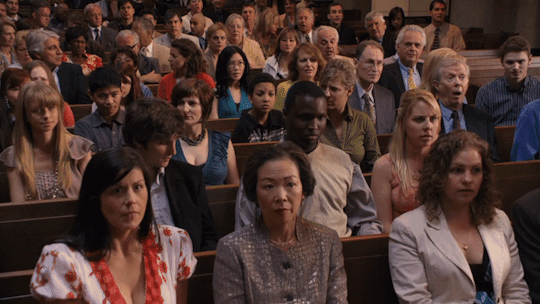
Yeah it's bad. Really bad. But Katara is a 14 year old, dealing with grief. By no means this is an okay thing to say. But let's dive deeper – how her mother's death effected her, the dynamics it created and if there is any truth to what she's saying.
Katara has always been the care giver, the one who'll notice when you're in need, giving seemingly unconditional emotional support. Even prioritizing other's well being over her own. In The Deserter, Aang acted careless, using his firebendering to accidentally injure Katara. Unsuprisigly, Aang feels terrible about hurting her. He is confronted about it not by Katara, but by Sokka. Meanwhile Katara heals her own scar. And in the end, she's the one comforting guilty Aang.
Another instance is The Desert. The Gaang was stuck without Appa, with little to no supplies, in the middle of a desert. They're all hungry, exhausted and unsure of what's to come. Katara shows incredible resilience and empathy – she offers her bending water to everyone, but isn't show to drink any herself. And her response to Aang's outburst after semi failinh to get water from a cloud.
Katara: Wow, there's hardly any in here..
Aang: I'm sorry, okay?! It's a desert cloud! I did all I could! What's anyone else doing?! *Points at Katara* What are you doing?
Katara: Trying to keep everyone together. Let's just get moving. We need to head this direction.
In the end of the episode, Aang finds the sendbenders who stole Appa. He gets in the Avatar state, and while all the other characters run away, Katara stays, she hugs him in an uncontrollable rage. Want to hear something interesting? We don't see the characters express gratitude to her efforts. Even in the next episode she helps strangers give birth.
Instead of resolving her trauma, Katara internalized it. She became "the mother". She is the reason Sokka doesn't bring up his mother. I'd like to add a quote from Sokka in The Runaway:
"I'm gonna tell you something crazy. I never told anyone this before, but honestly, I'm not sure I can remember what my mother looked like. It really seems like my whole life, Katara has been the one looking out for me. She's always been the one that's there".
This is the closest we got to giving Katara the much needed support. Their grief is not the same.
Same goes for Aang's grief. Yes, he lost his entire nation. While Katara's grief molded her character, Aang's grief is only brought up when used in context. It's only brought up explicitly 3 times: In The Southern Air Temple, while finding out what happened for the first time; in The Storm for giving us his backstory and in The Guru when he has focus on his grief. It's also used to create another layer of tension 3 other times (The Northen Air Temple, The Desert and The Serpent's Pass). In every time it's brought up, it's linked to the overall plot/subplot in some way. It isn't something that is shown to change who he is as a person.
Katara on the other hand, took on the mother role in the age of eight, fundamentally changing who she is. She is used to swallowing her pain, to suck it up because others need help. Only showing weekness when alone, when no one from the Gaang is looking.
Almost everything about her is somehow linked to Kya. She cooks, she she sews, she gives orders – like a mother. A quote from The Runaway:
Katara: What do you think, Aang? Do I act like a mom?
Aang: Well, I-
Katara (intensively): Stop rudding your eye and speak clearly when you talk.
Aang: Yes ma'am!
That's her canonical love intereat what? So casually, it's about Kya. The trauma they all experienced is semi the same, but the impact was completely different. Katara's experience of grief is fundamentally different from Sokka's and Aang's and never had a proper closure.
Until The Southern Raiders. Katara has a chance to finally express all of this pent up trauma. You might not think it's healthy, or sympathetic, but now it's Katara's grief that is on full display. But Aang and Sokka weren't understanding. They suggest her to go right back to what she has been doing for years. Aang even compares her loss to losing Appa and tells her she sound like Jet. And in a moment of humanity, weekness and frustration, Katara lashes out.
#oh my god#I'm done#also don't get me started on the fact that katara also feels guilty of her mother's death#because she died instead of her#okay that's it#I swear#katara deserved better#katara deserves better#katara defense#in defense of katara#anti kataang#katara of the southern water tribe#the southern raiders#water tribe#atla katara#atla#avatar#avatar the last airbender#avatar katara#Avatar the last airbender katara#katara#avatar aang#katara meta#katara analysis#media analysis#analysis#atla meta#avatar the last airbender meta#atla analysis#katara my beloved
98 notes
·
View notes
Text
another bone i have to pick with atla fic writers, writing katara in a way that makes her out to be a totally unreasonable bitch who goes out of her way to hurt zuko or refusing to treat him is completely ooc. katara, no matter how much she hates someone, always tries to help, it is the core of her character, no matter how angry she is, no matter how much she can hate, she always, always, chooses compassion and forgiveness. This is a choice she makes even when confronting her mother's murderer. She could have killed him or done any number of things to him, but she didn't. In her own words, Katara will never, ever turn her back on someone in need. That is Katara's greatest strength and what makes her my favourite character.
In the beginning she, like Sokka, is helpless to the dangers her tribe faces. When she, Aang and Sokka travel to the North Pole, she is yet untrained, and if caught or attacked, she doesn't have much in the ways of defending herself, but despite this, she goes out of her way to try and help other victims of the war in any way she can. After being trained, she has the power to defend herself and others. She even gains the ability to blood bend. With all this power that she didn't have before, she could have gone the way of Jet and exacted her revenge in anyway she could, without considering how it hurt innocents. She could have done a lot with her bloodbending. But she didn't. She draws a line in the sand, she chooses "good", she chooses to be compassionate, even when it would be so much easier to hate, and hurt, even when it would make far more sense to turn someone away. Katara is the first person to give Zuko a chance, despite the fact that he has been chasing them from the moment Aang came out of that iceberg. Zuko had been pursuing the gaang the way Azula hunted them for far longer, even if he didn't deprive them of sleep. He at one point caught her and tied her to a tree. Katara had so many legitimate reasons to hate him and turn him away and not trust him. And we know she is capable of hate, we know she is capable of hurting. But she doesn't. That's the point. That is who she is.
So making her a petty bitch going out of her way to cause bodily harm to poor baby zuzu, is extremely disingenuous. We, as the audience, know Zuko's arc, we've seen his journey, we've watched him realize the harm the fire nation causes, the atrocities they've committed and resolve to no longer be a part of that and eventually accept that he has to actively make the world a better place. We know that his betrayal under Ba Sing Se was him backsliding, and was ultimately what sealed the deal in terms of him coming to realize the full extent of the fire nation's corruption. But their world didn't sit around "waiting for him to switch sides, and had to plan for a future where he didn’t" (quote from 'There Within' by Avataraccount on ao3). And a direct consequence of Zuko's betrayal was Aang's near death and destruction of the Avatar cycle. Katara was the one who worked tirelessly to keep Aang alive, to keep the world's last hope alive. She was the one who had to directly face the devastating consequence of her choice to trust Zuko in the caves. So when Zuko comes back and reiterates the spiel he gave her (albeit with stronger and firmer conviction but that makes no difference to someone who has heard a version of it before and watched him go back on it), Katara is well within her rights to not trust him. Making her distrust seem like it is childish or selfish is ridiculous. As is trying to justify it as her "character flaw". Katara is learning from what she deems as her mistake from before. In fact, she's making the smart decision!
#atla#avatar#avatar the last airbender#katara#katara analysis#part of it is just misogyny#like its just people going poor baby zuzu who has never done anything wrong in his life#and awful katara who doesn't give him a chance and is thus a monstrous person for it#which actually ends up undermining zuko's arc!#the point is that zuko did do wrong#zuko made mistakes#over and over again#but despite all those times he backslid and every time he did a bad thing#he learned#and he grew#and there were consequences to his actions before he switched sides#which is what makes that final part of his arc that much more impactful#making him someone who does no wrong is a disservice to his character#also i love how his whole arc is him choosing to be “good” and a better person which is something katara chooses day in day out#look i just want katara and zuko to be besties
10 notes
·
View notes
Text
actually i just realized why interpretations of [atla] characters that are like “aang doesn’t lie” (blatantly textually false) or “katara would be offended by swearing” (sensically false) are so common. aang and katara are the most overtly ethical characters in the show, and people [subconsciously] associate morality with honesty and “clean language.” but none of aang’s principles preclude him from lying (he lies. a lot), just as nothing in katara’s moral code dictates that she must be a square (she is, in fact, the furthest thing from a square, and if you argue otherwise you are simply misremembering her character). i can understand why people think that an ethically principled person would consider honesty a virtue, even if aang clearly doesn’t, but the association between morality and language feels like a very christian (to broadly generalize) conception of “sin” and moral transgression that doesn’t map onto the atla characters whatsoever, and is entirely a projection of the largely american (and otherwise western) viewership. inversely, fanart that depicts “modern au” azula as some kind of goth abg with dyed hair and leather pants also attempts to map our internalized notions of how aesthetics are illustrative of morality onto a character who would clearly never present herself in any way countercultural. if azula were suddenly transported to montclair, new jersey, she would be a conservative and present herself accordingly (most likely scenario she would dress like shiv roy). i’m not saying all this to condemn the activity of projecting onto characters, as i clearly participate and engage in these fandom-cultural practices, but rather that i think it’s important we be mindful of what connotations are carried in certain interpretations and depictions, because even our subconscious associations can stem from a legacy of cultural contexts, often embedded within harmful institutions we may not consciously wish to associate with, or that are simply not useful or relevant associations when thinking through whatever thing we are in the process of fandomitizing.
#is fandomitizing a term. if not i just coined it#analysis#katara#aang#azula#cite the primary source read the text format your citations in mla or chicago#etc etc
3K notes
·
View notes
Text
I actually like zutara as a concept, it's a ship I'll casually read fics about them sometimes.
it's just zutara fans are fucking delusional. Stop treating their Canon partners as abusive when it's the complete opposite. Especially Mai.
Aang isn't a misogynistic monk that forces katara to be his house wife. If he did katara would leave him in a millisecond. He actually cares so much about her. It's actually Canon HE cooks and accommodates his cultural food with kataras.
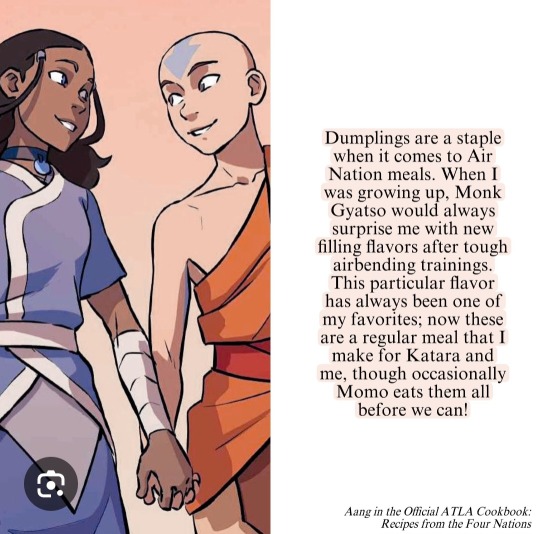
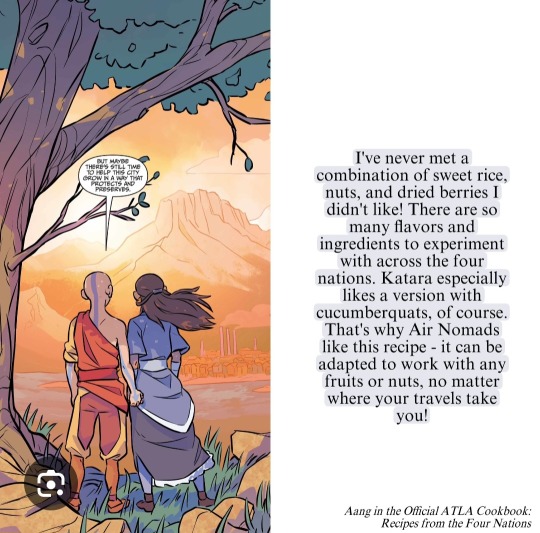
And Mai was literally ready to die for zuko. Even when they just broke up, she was ready to get electrocuted by azula if it wasn't for ty lee chi blocking azula.
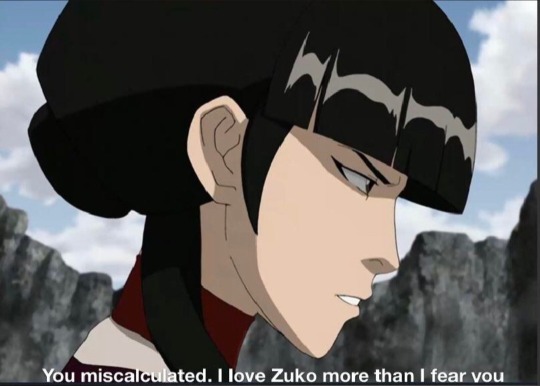
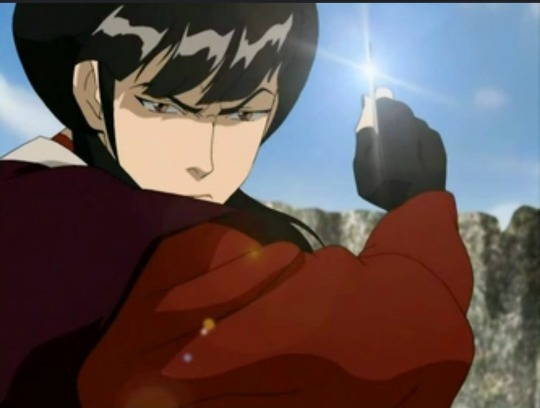
I'm aware it seems like she doesn't care about him the way she's quiet and aloof but I understand where she was coming as someone who somewhat has similar tendencies of being a little awkward when trying to show emotions and it coming off as being uncaring or rude. But at the end of the day she really shows she loves him, so people saying she's abusive is completely inaccurate to her character.
Her bottling up her emotions was taught by her parents as she explains in the beach episode somewhat where she had to worry about her father's reputation all the the time, forcing her to be quiet as a form of behaving.
Personally I think her quiet personality fits with Zukos loud ass, especially giving him a reality check during the beach episode calling him out for being angry all the time and how he needs to keep it in check.
Zutara is a nice ship I agree but you can ship it without mischaracterizing tf out of thier Canon partners.
#prince zuko#atla zuko#fire lord zuko#zuko#katara atla#katara avatar#katara#kataang#katara of the southern water tribe#mai atla#mai avatar#atla maiko#maiko#pro maiko#avatar aang#avatar: the last airbender#avatar#avatar the last airbender#atla#character analysis#shipping discourse
923 notes
·
View notes
Text
Excuse my Zutara fangirlism but I’m on my hundredth ATLA rewatch and I just noticed another one of those scenes that could have made for PERFECT foreshadowing… it’s really crazy how this ship wrote itself in the show!
Anyways notice how Katara reacts to Jet seemingly wanting to join the gaang and Toph calling her out on it:
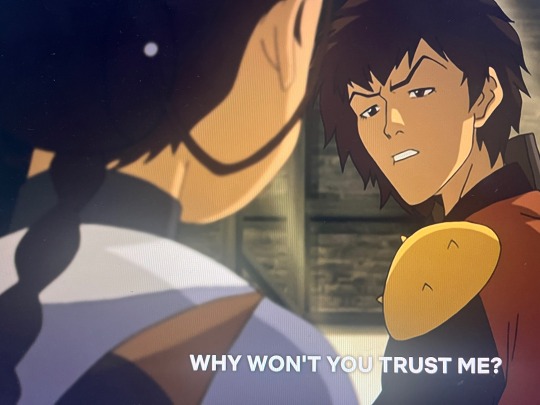

(Excuse the bad quality Netflix didn’t allow me to take screenshots bahah)
And then:
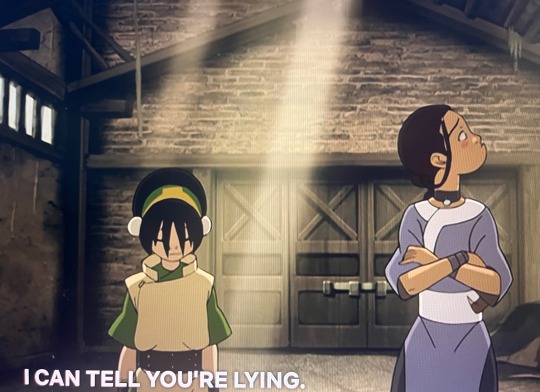
She’s blushing because she obviously had feelings for Jet, a canonical love interest of hers.
But doesn’t this scene strike you as familiar in any way…..?
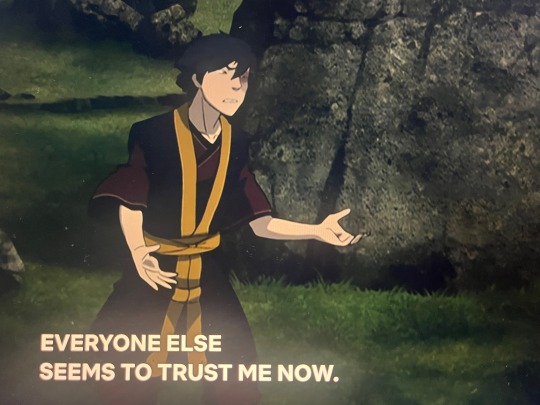

She reacted the same way with Zuko, these scenes are so identical it’s INSANE! The subtext!! *screams*

But this time Zuko is genuine and works to gain her trust back!! And then we see him risk his life for her like a couple episodes later…. AHHHHH
How are they not a canon couple again??
#zutara#Zuko x Katara#Prince Zuko#Zuko atla#Katara#katara of the southern water tribe#jet atla#zutara analysis#this ship has me in its shackles like please release me!#atla#avatar the last airbender#netflix avatar#avatar live action#natla#rambles#also the fact Jet and Zuko have similar vibes… Katara I know you was crushing baddd#Bryke tried to silence you but I know the truth#jet
620 notes
·
View notes
Text
It’s really funny how much people misremember certain aspects of ATLA and then proclaim to the internet stuff that either never happened or is extremely distorted with absolute certainty. For example, today I saw a person claiming that whole point of Katara’s character arc was unlearning the parentified behaviours she developed in wake of her mother’s death. That a huge part of Katara’s arc was a confrontation of how that trauma fundamentally shaped her maternal tendencies.
The thing is though…WE the audience, can recognize that the parentification Katara experienced was something that was really straining for her, but the TEXT doesn’t. The audience (or at least certain parts of the audience) can identify that her maternal tendencies were indicative of a responsibility that she took on far too young and subjected her to unnecessary pressure and stress. There are flashes of recognition maybe, but for the most part, the show doesn’t actually confront the negative impact that Katara’s maternal role had on her.
Katara never truly unlearns the maternal behaviours that put so much pressure on her because the text doesn’t see it as a bad thing. Arguably, the text doesn’t see much of a problem with the emotional labour Katara takes on and how that labour goes unreciprocated for the most part (particularly from her canon love interest). We see some reflections, but it’s not enough to support a reading of the text where that element is actually extremely obvious and a prominent point in her character arc.
We’re not the ones “watching the show with our eyes closed”, I think you’re just misremembering the canon progression of Katara’s arc to avoid confronting a real issue in the text.
#Katara#pro katara#avatar the last airbender#atla fandom critical#atla discourse#the gaang#character analysis#atla fandom discourse#zutara#atla critical#anti bryke
427 notes
·
View notes
Text
Katara and Mutuality in Relationships
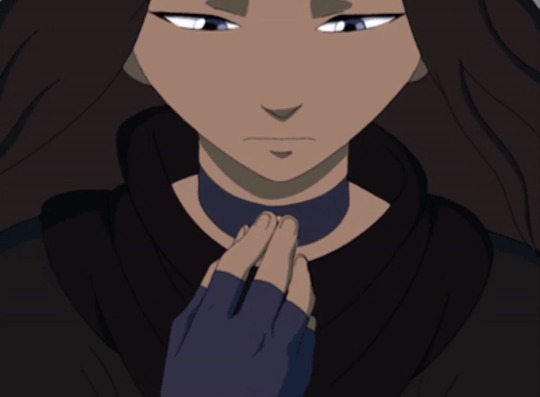
There are lots of conflicting opinions about which characters Katara felt attraction towards, which characters she didn’t, and how long she felt that attraction. I see in most cases, people point to quick clips of her faintly blushing or kissing another character on the cheek as evidence, but I think these kind of takes miss the nuance of the purpose attraction serves in a story.
Most importantly, I see these characters treated as if they are actually people capable of making their own decisions. It’s important to remember that these are fictional characters. They don’t make their own choices; the writers make their choices for them for the purpose of telling a story. From that standpoint, it’s more valuable to examine how a character’s story and narrative themes tie into their relationships with other characters. Animators can shove in a kiss or a blush wherever they want, but it’s harder to demonstrate through storytelling how and why two characters might feel attraction towards one another, and how a relationship between them would develop both characters and contribute to the overarching themes of the story.
In other words, when discussing which characters Katara is “attracted” to, I’m discussing which relationships and actions within the narrative build on her established story and arc. Romance is always integrated into a story for a reason, and considering that reason is important.
Unfortunately, ATLA is very much a product of its time in this way. It’s easy to see what romance adds to the arcs of the male characters—but not so much with the female characters. All three canon relationships (kataang, sukka, and maiko) follow this trend to some degree. The primary purpose of the woman in this narrative is to act as a prize for the man for performing some good deed. Once they’re together, she ceases having her own motivations and becomes an extension of the male character she’s dating. This is pretty blatant with Suki—she barely had a personality in that later seasons; she is there to be Sokka’s girlfriend. Similarly, Katara becomes a completely different character—she’s even animated differently—when the narrative pushes her into romantic scenes with Aang. Her character is flattened.
So what is Katara’s arc, and how do the romantic interactions she has throughout the series contribute to this?
Well, that could be a whole other essay itself, but to put it simply, Katara’s arc is one of a young girl devastated by grief at a young age clinging to hope that she has the power to fight and change the world for the better. Which she does as she gains power and confidence throughout the series—culminating in her defeating Azula in the finale.
But the part I want to focus on here is how Katara connects with other characters. She connects with them over shared experiences of grief and loss.
Take Haru, for instance.
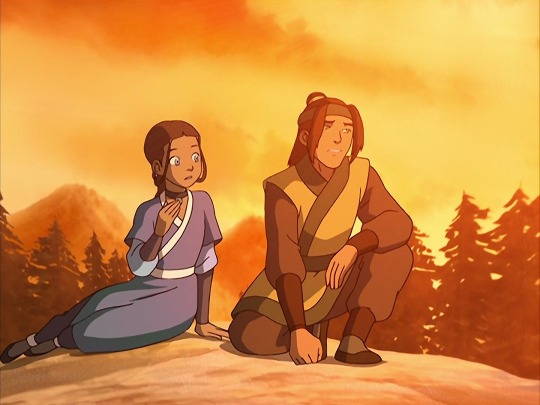
Haru: After the attack, they rounded up my father and every other earthbender, and took them away. We haven't seen them since.
Katara: So that's why you hide your earthbending.
Haru: Yeah. Problem is…the only way I can feel close to my father now is when I practice my bending. He taught me everything I know.
Katara: See this necklace? My mother gave it to me.
Haru: It’s beautiful.
Katara: I lost my mother in a Fire Nation raid. This necklace is all I have left of her.
Haru: It’s not enough, is it?
Katara: No.
This isn’t just a throwaway moment; it’s an important character moment that leads up to growth and the progression of Katara’s overall story, both in this individual episode and in the whole series.
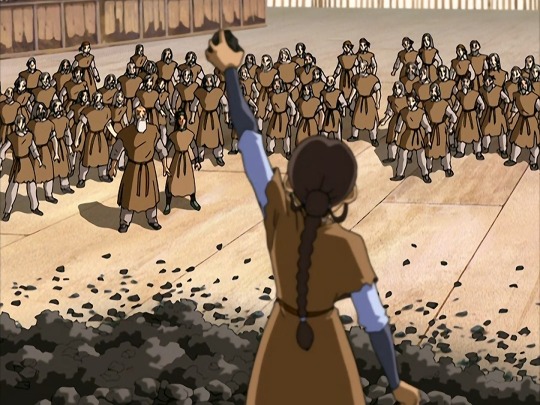
Katara finds her power in the connections she’s able to make with other characters. It’s a powerful driving force for her that makes her a strong character even before her bending abilities develop. Imprisoned was such an important episode to establish who Katara is and what her power is, and adds so much to her arc.
But there is one line in particular from the above exchange that also stands out: Haru says “it’s not enough, is it?” and Katara agrees. Even this early in the series, we’re establishing the fact that despite her drive and hopeful outlook, Katara feels deeply hurt, she feels a deep sense of loss that she opens up about to other characters in moments like these. But unlike Haru…Katara can’t go rescue her mother. Her mother is dead, and we see her grapple with that grief throughout the series.
Another character she reaches out to like this is Jet.
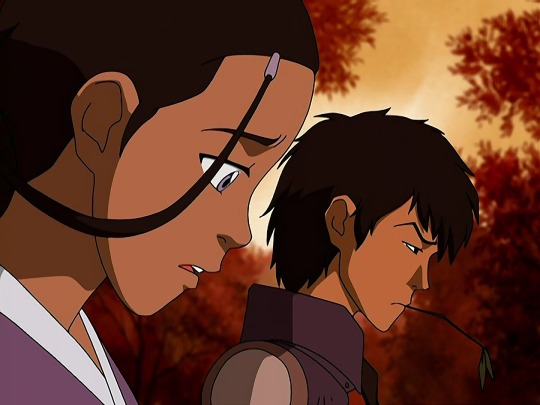
Jet: Longshot over there? His town got burned down by the Fire Nation. And we found The Duke trying to steal our food. I don't think he ever really had a home.
Katara: What about you?
Jet: The Fire Nation killed my parents. I was only eight years old. That day changed me forever.
Katara: Sokka and I lost our mother to the Fire Nation.
Jet: I’m so sorry, Katara.
Another important note about Jet is that there are explicit romantic feelings from Katara in this episode. Again, Katara empathizes with another character through a shared sense of loss. Sadly, in this case, Jet manipulated her feelings and tricked her into helping in his plot to flood the village…but those feelings were undeniably there.
That was the tragedy in this episode, but it also gives the audience so much information about Katara as a character: what motivates her, and what she wants. Katara is established as a character who wants someone who will connect with her and empathize with her over her loss—her greatest sense of trauma. She wants to help others but also receive support in return. The reason why she was smitten with Jet, beyond just initial attraction, is because he gave her a sense of that before Katara realized his true motivations.
A lot of people make the claim that Aang is good for Katara because he also feels a sense of great loss and trauma. And while on paper that’s true…does he really demonstrate that? I just gave two examples of characters Katara connected with this way, and both responded with deep empathy to what she said. Very early on in the show—the third episode—Katara attempts to connect with Aang the same way. How does he respond?
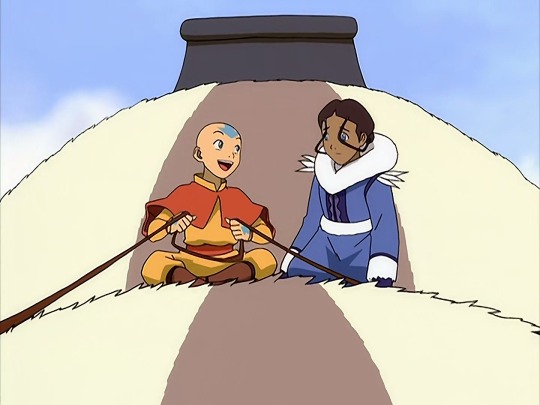
Katara: Aang, before we get to the temple, I want to talk to you about the airbenders.
Aang: What about 'em?
Katara: Well, I just want you to be prepared for what you might see. The Fire Nation is ruthless. They killed my mother, and they could have done the same to your people.
Aang: Just because no one has seen an airbender, doesn't mean the Fire Nation killed them all. They probably escaped!
Just compare this exchange to Haru and Jet. No effort to empathize, not even a “sorry for your loss” or anything. It’s a stark contrast, and the reason for that is because this narrative entirely centers Aang. Katara’s narrative always seems to be secondary to his when they’re together—which is exactly my point when I say this relationship has a fundamental lack of mutuality. It’s built that way from the beginning of the series. It does not add to Katara’s arc nor establish what about this dynamic would attract her.
And, look, before someone jumps down my throat about this…I’m not saying Aang is a horrible person for this response. I think it’s a sign that he’s immature and has a fundamentally different approach to problems than Katara. Katara is a character who has been forced to take on responsibilities beyond her years due to being a child of a war-torn world. Aang’s approach to problems is avoidance while Katara never had that luxury. It doesn’t mesh well.
This is all in Book 1. I honestly could have gotten on board with Kataang if the series meaningfully addressed these issues…but it didn’t. In fact, they actually got worse in some ways.
Back to Katara’s mother. We’ve established that this is a core part of Katara’s character and like in the scene with Haru, she indicates that this is an unresolved issue that pains her. But then, in Book 3, Katara actually does get a chance to confront this pain.
This would have been a powerful moment. Surely the character who is meant to be her partner, her equal, would have been there for her. Surely he would have understood and supported her, fulfilling her narrative and adding to her story.
But Aang didn’t do that. I won’t go into details because there are a million analyses out there on The Southern Raiders, but Aang’s response to Katara was the opposite of understanding. He got angry with her, insinuated that she was a monster for wanting revenge, and tried to dictate her behavior according to his own moral values. And importantly, from a narrative standpoint, he did not go with Katara. One of the most important events in her arc, and Aang didn’t support her—he actually tried stopping her. He didn’t contribute to her growth and development.
Also noteworthy:
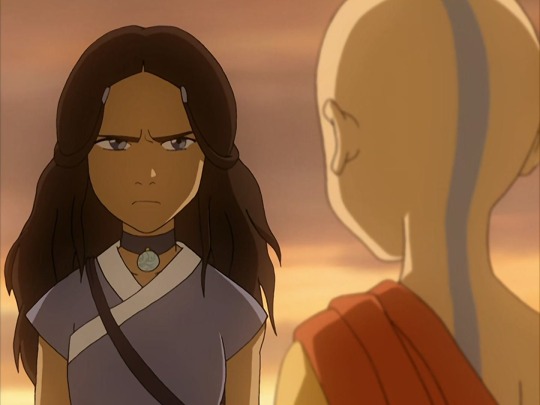
Katara: But I didn’t forgive him. I’ll never forgive him.
Even at the end of the episode, Aang clearly doesn’t understand at all what Katara is feeling. This line demonstrates it perfectly. He thinks she forgave him when that wasn’t the case at all…but of course, he didn’t even accompany her, so he didn’t see what actually took place. His worldview is fundamentally different from hers, and he’s consistently too rigid in his morality and immature to center Katara’s feelings.
Throughout Katara’s whole arc, her most significant character moments, Aang’s character just doesn’t come through the way Katara’s constantly does for him. Their narrative lacks mutuality. When Katara and Aang are together, she becomes an accessory to him. The ending scene is a perfect demonstration of this.
Now, to address the elephant in the room.
Which character does actually add to Katara’s narrative and support her growth as a character?
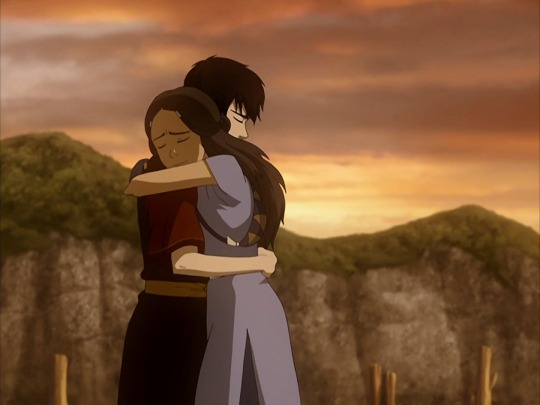
Correct! I just talked about how important The Southern Raiders is to Katara’s character and story, how it’s a chance for her to finally address the grief she’s been carrying since Book 1. And who stood by her side throughout this pivotal moment? Right—Zuko did.
You can talk all you want about how he’s a “colonizer” while Aang’s people suffered genocide, but you’re forgetting that “show, don’t tell” is one of the most basic aspects of storytelling. The fact is, despite how it looks on paper, Zuko was the one there for Katara at her critical moments. Zuko empathized with Katara more than Aang ever did—as demonstrated in this episode. Zuko never once brought up his own cultural values. Zuko never once told Katara what to do. Zuko’s position was that Katara should be the one to decide, and that he would support any choice she made. He supported her decision to spare Yon Rha, but he would have also supported her if she decided to kill him. I actually found this episode to be a satisfying reversal to what is typically seen in TV—for once, the female character is centered while her male counterpart takes the backseat and becomes a supporting role to her narrative.
Even before this, Zuko is shown to empathize with Katara.
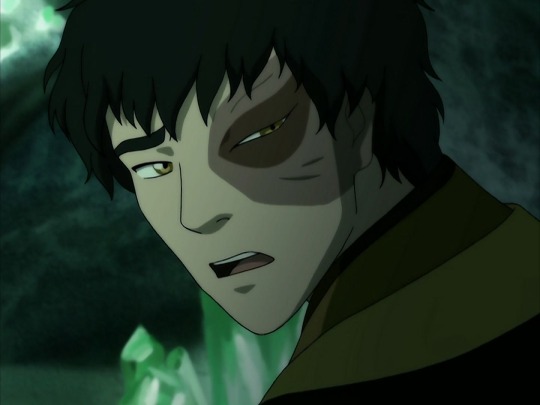
Zuko: I’m sorry. That’s something we have in common.
I think what gets me about this scene is the fact that he’s still Katara’s enemy, and she was just yelling about how she hates him and his people. But despite that, Zuko still empathizes with Katara. She is fundamentally human to him, and he expresses that to her in a way that allows them to connect. Zuko stands to gain nothing from this. It’s true that Azula entered the picture and twisted things around—but in this moment, Zuko’s compassion is genuine. His instinct was to respond to her grief with empathy, just like she consistently does for other characters.
And finally, how else does Zuko add to Katara’s arc?
I don’t think there is any more perfect of an example than the finale itself—the culmination of the arcs and development of all characters.
Zuko and Katara fight together. In a heartbeat, Zuko asks Katara to fight by his side against Azula, because he trusts her strength. She’s his equal—both in his mind, and in a narrative sense.
Then, this:
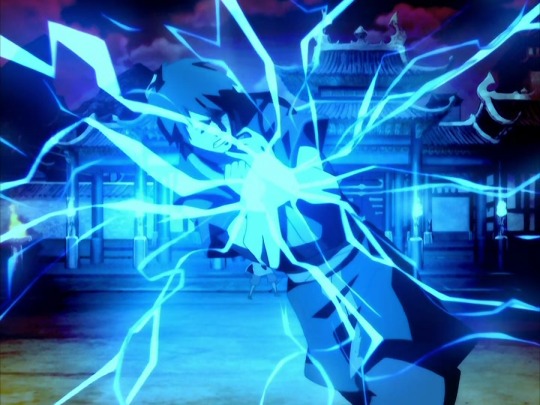
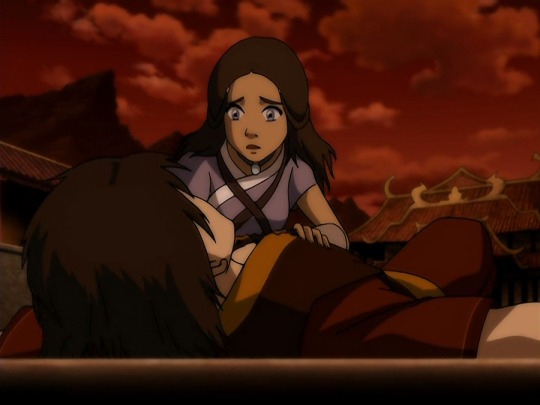
Both of their roles are so critical in this fight. They both save each other. The scene has such raw emotion to it. These characters were together at the conclusion of their respective arcs for a reason.
This is the perfect conclusion to Katara’s arc. She just played a critical role in ending the war that has caused her trauma her whole life. She just demonstrated her mastery of waterbending (another thing she’s dreamed of throughout the series) by defeating the world’s most powerful firebender during Sozin’s Comet. Even though she had help as all characters do, these are victories that belong to her and demonstrate the growth and power of her character. And to top it all off? She was able to save Zuko’s life. She didn’t have to endure the pain of feeling helpless to do anything while someone else died for her; this time, she had an active role, she changed her fate, and she prevailed. Zuko plays an important role in Katara’s story without dominating it. They perfectly represent mutuality. They add to each other’s stories. Their narratives become stronger when they’re together, without one diminishing or sidelining the other.
So, from that standpoint, that’s why I always see the attraction between Zuko and Katara and why I see it lacking between Aang and Katara. Zuko and Katara’s story doesn’t need some cheap little throwaway moments to shine. It’s integral to both characters’ stories. We are shown not told of the way these characters feel about each other. Given everything we know about Katara, her goals, her values, her past loves…absolutely everything points to Zuko being the true subject of her feelings.
Because let’s be honest. The ending I just described is so much more powerful and so much more Katara than seeing her being relegated back to a doe-eyed love interest for Aang to kiss. It hardly even made sense—Katara played no role at all at the culmination of Aang’s arc. She was relegated back to a love interest, rather than the powerful figure we saw fight alongside Zuko.
#zutara#katara#zuko#atla#anti kataang#canon critical#jet#haru#katara deserved better#aang critical#meta#analysis
372 notes
·
View notes
Text
Damn, the Ember Island Players were actually kind of radical, weren't they? The more I think about it, the more it feels like the only way it makes sense in-universe is if being Fire Nation propaganda wasn't the point of their play at all. Aside from a barely tacked on ending where Ozai kills Aang, the play is remarkably sympathetic to the Avatar and a bunch of enemies of the Fire Nation, even framing them as being heroes. Even at points in the story where theyre literally killing Fire Nation soldiers, the narrative still seems to be on their side; they're the underdogs, the relatable ones. Its true that the Fire Nation values strength, but still, you'd expect that in a propaganda play they would be portrayed as at least a little bit more sympathetic... And sure, to some extent the gaang's characters could be seen as defamatory caricutures (the slander on Iroh specifically was probably intentional), but that also might be due to the Players getting a lot of their information from the cabbage man, someone who actively hates the gaang and only ever really sees the worst of them. (And notably, that also means that the Players had worked with an Earth Kingdom merchant to produce the play.)
Mocking the gaang is also just clearly not the point of the play or what people are there for. Sokka's actor says that he's constantly being approached by fans; people genuinely love these characters. The gaang have built entire dedicated fanbases in the Fire Nation because of this play. Honestly, the fact that they're on a remote island is probably the only reason they're able to perform the play the way it is. I imagine it would get shut down pretty quickly on the mainland. Considering all the propaganda in the Fire Nation that we've seen so far, I wouldn't be surprised if the ending was only written that way because it's illegal to write a story where the Fire Lord doesnt win. The play reads less like propaganda and more like 'we're doing the bare minimum to get this story past the censors.'
I'm really curious about what it's like behind the scenes for the Ember Island Players. Are their shows just simple, shlocky entertainment, or could they also be deliberate political commentary? With no recording technology, a play is easier to slip under the radar than something like a book: it's impermanent, stays in one theatre, and performances can be easily tweaked if, say, Fire Nation royalty happens to come by. It's interesting to me that Ursa seemed to like them, while young Zuko had a disdain for them, saying they 'butchered' the story of Love Amongst the Dragons; in all likelihood the version of the story Zuko grew up with in the palace was heavily propaganda-filtered itself. Although, to be fair, they're arguably just not very good playwrights. When it comes to the characterization, I do think some of it only seems bad because we know what the actual characters are like, but a lot of it is just bad writing clearly meant for cheap entertainment. For example, they sexualize Katara quite a bit (and there's other, better analysis out there I've seen that examines how they fetishize her as a Water Tribe girl). And, of course, all of the characters are reduced to shallow and stereotypical comedy.
Still, I think they're worth commending for doing their research and telling a story about enemies of the state that's both sympathetic and surprisingly accurate to actual events, if not the characters' personalities, amidst the Fire Nation's rampant propaganda and misinformation. From the little amount of information about them we can extract from the show, they seem like honestly very interesting people. They're walking this tightrope line between being very close to the heart of the Fire Nation but also separate from it; between being cheap, inconsequential entertainment and being a source of actual news for Ember Island citizens; between telling the underdog story about a ragtag group of children and still trying to make it look like Fire Nation propaganda. I'm not trying to make any big argument on whether they were 'actually good people' or whatever, I just want to know more about them. I kind of wish we could see their production of Love Amongst the Dragons now...maybe I'll write something about them someday
#I wrote this in a haze after randomly catching the episode while my sister was watching it#I'm so fascinated by the inner lives of these people. What does it look like to write and produce these plays?#What does their day-to-day look like? How do the actors feel about their characters?#Actually if anyone has any fanfic recommendations in this vein please tell me#atla#avatar the last airbender#ember island players#the ember island players#atla analysis#zuko#uncle iroh#katara#ursa atla#cabbage man#cabbage merchant#fire nation
228 notes
·
View notes
Text
How LOK Fails to Do Katara Justice (part II)
In part one of this meta, I explained how Katara's character received the worst treatment in Legend of Korra compared to the other members of the gaang, and the sexist writing of lok!Katara so that she is only defined by her relationships to her husband and children. In the second part of this analysis, I will explain how the common arguments that are used in defense of LOK's poor writing do not provide an adequate in-universe explanation for Katara's drastic change from ATLA.
Defense of lok!Katara seems to boil down to three main points:
1) The “leave it to the kids” excuse: Katara is from the previous generation so she shouldn’t be expected to be involved in the plot - it’s time for Korra’s team to have a turn.
2) The “old lady” excuse: Katara is too old to be fighting wars or getting involved in international politics.
3) The “people change” excuse: Katara’s character, personality, and goals would change over time because she’s older now.
I would be willing to accept these excuses under the condition that they are also applied to the other members of the gaang. Ignoring the fact that the Order of the White Lotus is literally a bunch of old guys fighting in wars in ATLA, if Toph and Zuko are also portrayed as too old to be fighting and leaving all their problems to the next generation to fix, along with Katara, it wouldn’t be as much of a problem. If Sokka, Aang, Toph, and Zuko are all portrayed as having different goals and motivations and characteristics than when they were younger, along with Katara, then again, it wouldn’t be as much of a problem. (It might be bad writing, but hey, at least it’s bad writing applied equally to every character).
The problem is that it’s only Katara’s character that takes a complete 180 from how it was set up in ATLA, it’s only Katara’s character that is too old to fight to defend her family, it’s only Katara’s character who leaves all her problems to the kids and stays completely uninvolved from the geopolitical conflicts brewing around her.
Returning to our original three excuses, let’s see how well they match with rest of the gaang’s portrayal in LOK:
1) “Leave it to the kids” excuse:
I will be leaving Sokka and Aang out of this since they are dead at the time of the show (though it should be noted that flashbacks show both of them being heavily involved in global leadership roles and managing political conflicts).
This excuse is not even close to applicable to Zuko. As soon as he finds out Zaheer has escaped from prison, he flies off on a dragon to check the other prisons. He warns Lin to look after Korra, but this doesn’t stop him from investigating with Tonraq on his own, without Korra and co's involvement. As soon as he hears his family may be in danger, he flies off on a dragon to protect them.
This excuse doesn’t apply to Toph. She does state that she agrees with Katara that it’s time to leave things to the kids, but her actions say differently. As soon as she finds out Suyin has been captured, she immediately attempts to find her - on her own, without consulting with the younger generation. When she realizes Suyin has been moved somewhere else, she works together with Korra and co to save her family - twice actually. She also involves herself in Korra’s life by helping her train and recover from her PTSD.
Meanwhile, Katara does nothing when her home is dragged into a civil war, does nothing when her family is kidnapped, and does nothing when a bloodbender is using his abilities to oppress others (despite being the one to outlaw bloodbending).
2) “Old lady” excuse:
Again, also not applicable to Aang and Sokka because they’re dead at the start of the show.
This excuse does not apply to Zuko whatsoever. He never mentions that being old prevents him from fighting or getting involved in the political conflicts that arise. He has no problem fighting Ghazan during the Red Lotus prison break-in and has no problem riding his dragon. He stays involved in international relations despite being “retired” from his position as Fire Lord - helping to track down the Red Lotus, attending important international events, and holding meetings with leaders of other nations (Tenzin, Raiko, Tonraq).
Toph tells Korra that her fighting days are over due to having back problems, but has no problem fighting Korra during training and easily takes out Kuvira’s army.
Katara never fights during the entire show. And as far as I can remember, she never waterbends at all beyond healing on a few occasions.
I feel like it’s important to note that both excuses 1 and 2 are never even mentioned in regard to Zuko (or the Order of the White Lotus) - it’s only Toph and Katara that seem to be “too old” to fight and have to leave everything to the kids. Toph’s actions don’t align with her words, unlike Katara, but it doesn’t change the fact that these excuses are unequally applied to old women in Legend of Korra compared to the old men in Legend of Korra (and ATLA). Good old misogyny at work!
3) “People change” excuse:
Sokka: Begins his story in ATLA as son of the Chief of the Southern Water Tribe, desperately trying to fill his father's shoes when Hakoda goes off to war. He becomes the defacto leader of the gaang over time due to his fondness for schedules, his leadership abilities, and analytical thinking skills. Despite being a nonbender, he held his own with his trusty boomerang and strategic thinking. Ends his story in LOK having taken over from his father as Chief of the Southern Water Tribe, putting those leadership skills to use. His intelligence and strategic thinking made him an ideal candidate to be a Representative for the Southern Water Tribe on the Republic City Council, as he could be trusted to make smart decisions that were the best for his tribe. He was even elected chairman of the council due to these skills. A statue was built in his honor, which included his favorite boomerang.
Zuko: Begins his story in ATLA learning to heal from his father’s abuse and, in the process, slowly comes to understand the evils of Fire Nation imperialism. He replaces his father as Fire Lord and vows to start a new era of peace and harmony, ending the war and the Fire Nation’s colonialism and imperialism. He also vowed to work together with the Avatar to maintain balance. Ends his story in LOK having achieved peace and prosperity in the Fire Nation again. Turned previous Fire Nation colonies into the United Republic of Nations - meant to be a safe haven for anyone, regardless of nationality or bender status - by working together with Aang. Fights against the Red Lotus to protect Avatar Korra and his family. His statue, in contrast to Ozai’s former statue, is one representing peace and hope.
Toph: Begins her story in ATLA rebelling against her strict parents, who are overprotective of her due to her blindness. She learns to rely on and trust others over the course of the series, realizing that accepting help from others doesn’t mean she’s weak. She enjoyed pulling scams on naive civilians in the show using her earthbending seismic abilities and participated in the Earth Rumble in her youth. She also invented metalbending and worked as Aang’s earthbending teacher. Ends her story in LOK having created a metalbending academy to teach others the bending speciality, along with establishing the first metalbending police force. Metalbending is shown as having made significant contributions to technological innovation and progress in the avatar world. Helped to train Korra while she’s recovering from the her capture by the Red Lotus. Though she liked breaking the rules when she was younger, she found it more fun to be the person in charge of the rules - leading her to become Captain of the Police Force. Still suffering the consequences of poor parenting as a child, she became an overly-lenient parent, leading to problems with her daughters. She states that her fighting days are over, but still seems to enjoy fighting Korra.
(As a side note: I do not agree with how the writers chose to take Toph’s story. Do I think they should have - and realistically, could have - gone in a different direction that did more justice to Toph’s character? Yes. However, I also see how it could potentially be possible that she became a cop and uninvolved parent based on her background. I don’t like it, but I can at least see some logic behind her storyline - unlike Katara’s. If anyone feels differently, I'd love to know your thoughts.)
Aang: Begins his story in ATLA learning to become the Avatar by mastering all four elements, mastering the Avatar State, and acting as a bridge between the human world and Spirit World. Struggles with being the sole survivor of the Air Nomads and attempting to keep his culture alive. Works to keep balance in the world among the four nations by defeating the imperial Fire Nation. Ends his story in LOK having achieved his goals as Avatar, successfully keeping peace amongst the four nations and establishing the United Republic of Nations as a sanctuary for all, no matter nationality or bender status. Considered a spiritual leader and successfully kept peace between the spirit world and human world. Had an airbender child and airbender grandkids, traveled the world to spread his culture, including building a temple on Air Temple Island in the United Republic, and other characters repeatedly state that for his entire life, his dream was to revive Air Nomad culture.
Katara: Begins her story in ATLA trying to master her waterbending abilities, trying to teach herself on their journey. Views waterbending as a way to connect with her culture. She challenges the Northern Water Tribe’s sexism for the right to learn how to fight. Famously declares, “I don’t want to heal, I want to fight!” Passionate about standing up against injustice - causes a prison riot through an inspiring speech she gives, dresses up as a Fire Nation spirit to heal sick villagers, and goes after her mother’s killer. She is forced to bloodbend, a traumatic experience for her. Teaches Aang how to waterbend and is eventually bestowed the title of “master waterbender” by Pakku. Occasionally heals others when they get injured, but main focus is on development of her waterbending fighting abilities. Ends her story in LOK known as the best healer in the world, but fails to heal Korra and Jinora. Spends her time during the civil war on the sidelines, healing the injured. Marries and has kids with Aang. She’s lonely and her family doesn’t visit much. No known achievements beyond outlawing bloodbending (which she is somehow able to do without holding any political titles beyond that of the Avatar’s wife).
Hopefully it should be clear that Sokka, Aang, Toph, and Zuko's characteristics, goals, and motivations don't change as drastically as Katara's do. The writing of Katara in LOK did a disservice to her character. I've always deeply admired Katara for never failing to stand up against injustice, for her empathy and kindness even for those who are different from her, and for her determination not to let patriarchal norms define what she can and can't do. While LOK's portrayal of other characters provides a glimpse at how their character arcs in atla influenced the way they shaped the world, we never get a glimpse of the original Katara - only a lackluster imitation of someone with the same name.
If the Avatar franchise continues to expand with more post-ATLA content of the gaang as adults, I certainly hope Katara's characterization is improved.
#katara#katara analysis#atla#zutara#anti lok#lok critical#once again not shipping related only tagging zutara for visibility#my post#my meta
192 notes
·
View notes
Text
Let's Talk About How Book 3 Ruined Aang
If you've seen any of my prior ATLA posts, you know that I don't hate Aang. In fact, I quite liked him in Books 1 and 2. He was flawed, as all characters should be, but the show didn't shy away from those flaws or justify them. He was called out for burning Katara and rushing his firebending, Sokka and Katara were rightfully upset when he hid Hakoda's letter, he willingly owns up to the fact that his actions helped drive Toph away, and his entire arc after losing Appa and finding hope again in The Serpent's Path was beautifully done.
(Hell, even in The Great Divide Katara says what Aang did was wrong and he agrees. It's played for comedy, but the show still makes the effort to point out that what he did wasn't the right thing to do. You're just meant to understand that he was fed up and acted off of that)
Those flaws and mistakes were addressed and improved upon and helped Aang to grow as a character.
But for some reason, that aspect of Aang's character was completely flipped in Book 3.
The best examples of this are in both TDBS and EIP. Both the show and the fandom are too quick to brush off that Aang kissed Katara twice without her consent, one of which after she explicitly said she was confused about her feelings.
(And yes, she is angry in response and Aang calls himself an idiot. But after this, it isn't really addressed. They go on like nothing happened for the rest of the episode. Aang's lamentation comes from screwing things up with her romantically, not that he violated boundaries)
The show never really addressed why what he did was wrong. Not only because he wasn't given consent, but also because both times he isn't thinking about what Katara wants. In both instances, Aang is only thinking about himself and his feelings. This is something that persists through a lot of the third book. And by Sozin's Comet it ultimately ruins any character development he had built up in the second book.
One thing I feel was completely disregarded was the concept of having to let go of Katara in order to master the Avatar State.
For me, the implication wasn't that he had to give up love or happiness necessarily. He was emotionally attached to and reliant on Katara, to the point where she was needed to stop him from hurting everyone around him and himself. This is obviously detrimental to his functionality as the Avatar. And the point of him "letting her go" wasn't that he had to stop caring about her, it was that his emotional dependency on her was stopping him from being the Avatar he needed to be and that was what needed to be fixed. I don't even think it's about the Avatar State itself, it's about being able to keep your emotions and duty as the Avatar separate.
(If you look at Roku, he loved and had a wife. It wasn't his love for her that messed everything up, it was his attachment to Sozin. He wasn't able to let Sozin go and not only did he lose his life for it, the world suffered for it. It's the unhealthy attachments that seem to be detrimental, not love itself)
And Aang realizes that in the catacombs, which is how he's able to easily enter the Avatar State and seemingly control it. He let Katara go.
So then why does it seem like his attachment to Katara is not only stronger, but worse in mannerism? He liked Katara in Books 1 and 2- obviously- but he was never overly jealous of Jet or Haru. He only makes one harmless comment in Book 2 when Sokka suggests Katara kiss Jet.
But suddenly he's insanely jealous of Zuko (to the point of getting frustrated with Katara over it), off the basis of the actions of actors in a clearly misrepresentative play. Katara showed a lot more interest in Jet and Aang was completely fine with it.
(Speaking of EIP, Aang's reaction to being played by a woman was interesting. He wore a flower crown in The Cave of Two Lovers. He wove Katara a flower necklace. He wore Kyoshi's clothes and makeup and made a funny girl voice. He willingly responded to Twinkle Toes and had no issue being called that. And for some reason he's genuinely upset about being played by a woman? Aang in Books 1 and 2 would have laughed and enjoyed the show like Toph did. His aversion to feminity felt vastly out of character)
I guess my point is, why did that change? Why was Aang letting go of Katara suddenly irrelevant to the Avatar State? It felt like him letting go was supposed to be a major part of his development. Why did that stop?
Myself and many others have talked about The Southern Raiders. The jist of my thought process about it is his assumption that he knew what was best for Katara. And the episode doesn't really call out why he was wrong. Maybe sparing Yon Rha was better for Katara, maybe it wasn't (the only one who's allowed to make that choice is her). Pushing forgiveness? That was wrong. But the episode has Zuko say that Aang was right when the course of action Katara took wasn't what Aang suggested.
Katara's lesson here was that killing him wouldn't bring back her mother or mend the pain she was going through and that Yon Rha wasn't worth the effort. That's what she realizes. Not that she needed to embrace forgiveness. How could she ever forgive that? The episode saying Aang was right wasn't true. Yes she forgives Zuko, but that wasn't what Aang was talking about. He was specifically talking about Yon Rha.
And that was wrong. Aang can choose the path of forgiveness, that's fine. That's his choice. But dismissing Katara's trauma in favor of his morals and upbringing wasn't okay.
I know it sounds like this is just bashing Kataang. But it's not simply because I don't like Kataang, in my opinion it brings down Aang's character too, not just Katara's. But let's steer away from Kataang and Katara for a minute.
The one thing that solidifies Aang's character being ruined in Book 3 for me is the fact that he- at the end of the story- does the same thing he did in the beginning.
He runs away when things get hard.
Aang couldn't make the choice between his duty and his morals. So he ran. Maybe it wasn't intentional, but subconsciously he wanted an out. And this is really disappointing when one of the things he was firm about in Book 2 was not running anymore. His character went backwards here and that's not even getting into the real issue in Sozin's Comet.
There's been contention about the Lion Turtle intervention. For many- including myself- it's very deus ex machina to save Aang from having to make a hard decision. And that in turn doesn't reflect kindly on his character.
Everyone- Sokka, Zuko, Roku, Kyoshi, Kuruk, and Yangchen (who was another Airbender and was raised with the same beliefs he was and would understand which was the whole point of him talking to her)- told him he had to kill Ozai. They all told him it was the only way. And he refused to listen to any of them, rotating through his past lives until he was given the answer he wanted.
And before anyone says that I'm bashing Aang for following his culture, I'm not. Ending the war peacefully, in my opinion, wasn't the problem. In a way, I think it allowed the world to heal properly. However, that doesn't make up for the fact that Aang refused to make a choice and face the consequences of that choice. Instead, he's given an out at the very last second.
Even if he couldn't kill Ozai and someone else had to deliver the final blow, that would have been better than the Lion Turtle showing up and giving him a power no one's ever had before. It would have been a good compromise, he doesn't have to have blood directly on his hands but what needs to be done needs to still get done. It would also show that being the Avatar isn't a burden he has to bear alone. That when things get hard, he can't run away but he can rely on the people closest to him to help him through hard decisions.
All these issues aren't necessarily a problem with Aang. Aang prior to Book 3 didn't have most of these problems. This is a problem with the way he was handled
#aang critical#anti aang#tagging just in case#i don't want aang stans accusing me of cross tagging#it's really not anti aang tho#long post#anti bryke#this is their fault#look how they massacred my boy#anti kataang#katara deserved better#she's not the focus here#but i thought I'd add that there#character analysis#atla critical#anti book 3#which is kind of an exaggeration#because a lot of book 3 is great#it's just most of the latter half
221 notes
·
View notes
Text
I gotta talk about this moment even though it's been discussed a million times
Zuko, opening up to someone about his scar for the first time (from what we’ve seen in the show at least, but we can reasonably assume he hasn’t spoken about it like this since he got it) and explicitly stating that whilst he's always associated it with with failures ('the mark of the banished prince'), he's finally ready to take control and change his life for the better. And whilst he has accepted that he can never change his scar, it’s ok because he still has the power to change his destiny.
And despite this assurance, Katara, the healer, still jumps in and offers to heal it anyway, understanding that this is still a burden she could lift from him - 'What if you could be free of it?'
She knows it won't change his life in the same way taking control of his own destiny will, but still, it's like she can't help but try to ease his pain. Even if it's a pain that's long since become a permanent part of him, something that might seem surface level or cosmetic to others - 'It's a scar, it can't be healed.'
And then we have this
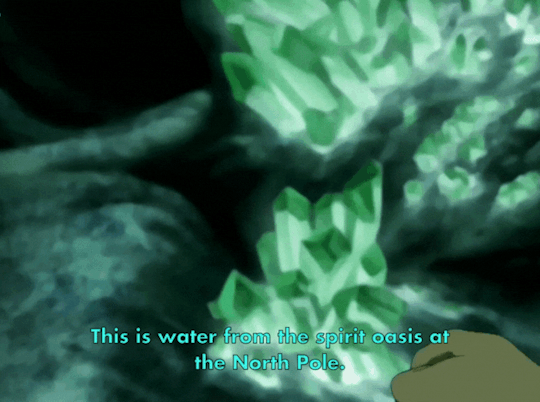

'I've been saving it for something important.'
This. Healing Zuko's scar. A wound that has, for all intents and purposes already healed and is not longer a threat to his life, but still burdens him emotionally. That has come to represent all of his trauma. This Katara considers important enough to use her limited and precious supply of spirit oasis water. In the middle of a war. In the middle of a dangerous journey to save the world in which she and her friends might be seriously injured at any time (including in this scene, where Ba sing se is literally under attack as they speak).
And if that weren't enough

'I don't know if it would work'
Now, I don't know the mechanics of spirit water in the atla universe, but it seems to be pretty heavily implied later in the episode when she uses the water to heal Aang, and for a moment thinks that it hasn't worked, that it's sort of a one-time deal.
Which means that she's willing to potentially waste the spirit water just on the off-chance that it might remove the scar. Which in the context of the wider story seems utterly insane.
But Katara thinks it's worth the risk.
And presented with this opportunity, this beautiful, selfless offer to ease his suffering, even on a purely physical, surface level, Zuko wordlessly submits, and lets her touch his scar.

Now, Katara doesn't know quite how significant this touch is (although she's very emotionally intuitive so I'm sure she has some inkling of the gravity of this action) but we do. We know that Zuko doesn't let anyone touch his scar, ever. So what this communicates to us as an audience is that Zuko is allowing himself, for the first time, to put his complete trust in someone. To be completely, 100% vulnerable with them.
And the moment of touch is all the more significant because, in many ways, it isn't even strictly necessary.
Katara's hands are empty, she isn't putting the spirit water to his face, to attempting to heal it here. And while I'd argue this touch could be a practical one - assessing the damage of the scar with her hands to see how to proceed before she uses the water - the moment after, right before they are interrupted, isn't one of practical, medical assessment, but of intimacy.
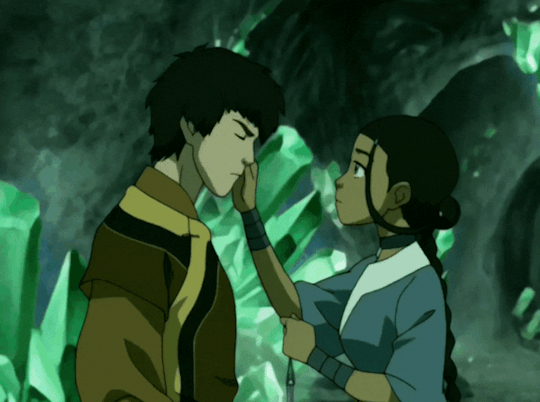
The way Zuko waits, patiently, eyes closed, and the way Katara pauses, just for a moment, doing what I can only describe as gazing at him, and that slow blink in the middle- Again, not examining his scar or reaching for the spirit water to begin, but just taking it all in.
It's so breathtakingly intimate and vulnerable - a point of connection between these two people who are supposedly so completely different but are, here, somehow so alike in their openness and understanding of one another.
That Katara offers to heal Zuko's scar even when he's said moments before that he's made his peace with the fact that he's never be free of it. And the way he accepts her offer without words because she's right, part of him does want to be free of it.
It's just an absolute masterclass in creating an immediate and powerful connection and bond between two characters in an incredibly short space of time from a start point of complete opposition without rushing it or making it seem implausible.
#I don't know how to end this is just needed to talk about this scene#they really send me into a feral frenzy#because how could this not be endgame when this scene exists???#anyway#zutara#Zuko x Katara#zutara meta#zutara analysis#my meta#atla#avatar the last airbender#my gifs
1K notes
·
View notes
Text
"Zuko would take a lightning for anyone–"
But it was Katara that he chose to invite.
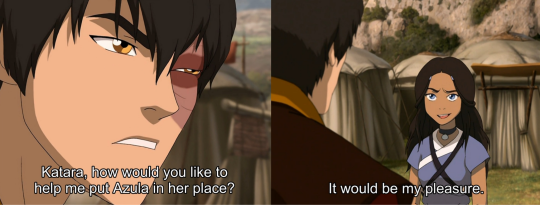
"Zuko would take a lightning for anyone–"
But Azula knew to aim at Katara.

"Zuko would take a lightning for anyone–"
But the scene was romamtically coded.
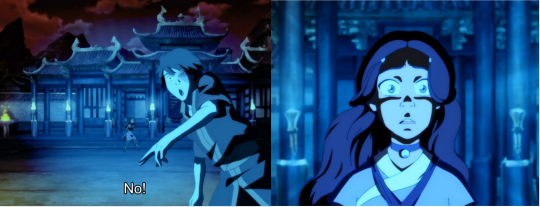
"Zuko would take a lightning for anyone–"
But Katara needed to get to heal him.
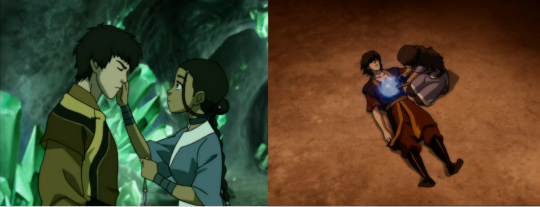
"Zuko would take a lightning for anyone–"
But it was Katara who was with him in season finales.
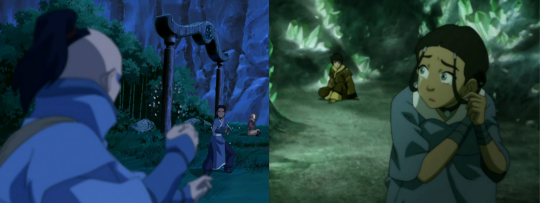
"Zuko would take a lightning for anyone–"
But he needed to choose Katara over Azula.

"Zuko would take a lightning for anyone–"
But Shu needed to survive in this life.
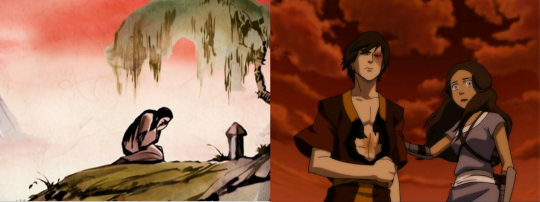
"Zuko would take a lightning for anyone–"
But the writers deliberately chose Katara.
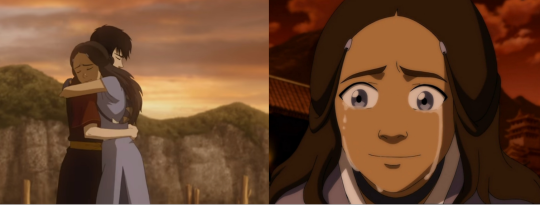
Inspired by @captain-konami-code 's "They were enemies"
#DISCLAIMER: I know this post isn't a full convincing argument. It's more for people who already agree.#it *definitely* falls under shitpost#zutara shitpost#<- the true nature of the post#zutara meta#<- for exposure#zutara#anti anti zutara#pro zutara#zuko x katara#katara x zuko#zukoxkatara#kataraxzuko#zutara analysis#zutara evidence#zutara forever#zutara nation#zutara was robbed#zutara supremacy#zutara should have been canon#atla critical#atla critisism#katara#zuko#prince zuko#katara of the southern water tribe
3K notes
·
View notes
Text

something something fire and water are opposites… something about air and earth being opposites… something about moon and sun, and an earthbender appearing to an airbender in a place of strong spiritual connection… something or such about waterbending techniques being used to create new unique firebending maneuvers… oh yes something about age and maturity in relation to peers… sometimes in regards to push and pull… or maybe equal and opposite action and reaction and how balance in all things (especially the elements) is always needed and as such is a primary reason for the avatar’s existence… mmhhh yes yes
#atla#zutara#taang#avatar the last airbender#zuko#katara#aang#toph#toph beifong#fire lord zuko#avatar aang#master katara#aang x toph#zuko x katara#atla netflix#avatar netflix#atla meta#atla discourse#atla analysis#atla live action#atla live action tv show
180 notes
·
View notes